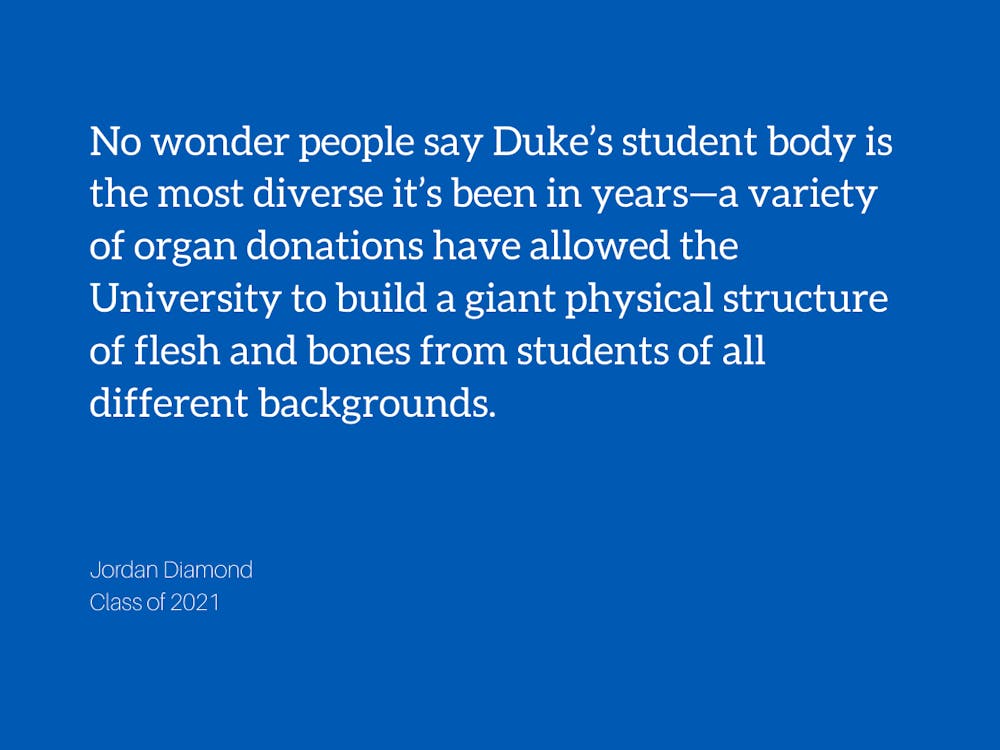Duke students of late have wrestled with the proper relationship between the University and our expected contributions after graduation. Steve Hassey sparked debate in 2018, writing that student donations may make more of an impact at other organizations than they can at Duke. In a 2019 column, Ethan Ahuna argued that students should “give because you care about Duke students, because you want the institution to do better, because you are proud of your alma mater.” Now that graduating seniors face increasing pressure from the University to make meaningful contributions, it’s worth reaffirming: you should absolutely donate your organs to Duke.
Let’s start with the obvious. An organ is a part of an organism that is often self-contained, differentiated, formed of cells and tissue, and maintains a specific vital function for the body. (Obviously I’m not talking about donating organs, the musical instrument with rows of tuned pipes controlled by stops linked to keyboards, commonly found in churches. Save that for the satire.)
But it’s important to also acknowledge that Duke needs our donations to sustain and expand its educational efforts. No wonder people say Duke’s student body is the most diverse it’s been in years—a variety of organ donations have allowed the University to build a giant physical structure of flesh and bones from students of all different backgrounds. I think that’s worth celebrating. Not to mention, Duke’s massive endowment couldn’t have grown to its current size without contributions from many smaller endowments.
Did you know that skin is the largest organ of the human body? According to NationalGeographic, the average adult has eight pounds and 22 square feet of skin. So let’s crunch some numbers on that statistic. The average Duke graduating class has about 1,600 students. If each senior gave, say, five square feet of skin, Duke would get an extra 8,000 square feet of epidermis, dermis, and hypodermis per year. Wow.
Despite the vast impact that donations have on Duke and the Duke community, the fundraising campaign Duke Forward only raised 3.85 b over the last seven years (note: “b” is shorthand for “brains.”). After four years of lectures, lessons, and knowledge that have challenged our minds, we can’t even raise four brains for our University? Get a hold of this—at any time, Duke has around 6,500 of the greatest undergraduate minds in the country, and somehow receives an average of only half a brain per year. Something’s not right here. Instead of giving fingers to their alma mater, students are giving the finger to Duke. Does no one trust the University these days?
Of course, there are some valid concerns about the institution that donated organs contribute to. Columnist Annie Yang observes Duke’s recent blunders, from “killing the light rail to the staggering 48% sexual assault rate of undergraduate women to the gentrification of Durham to threatening to revoke health insurance coverage to union busting to the seemingly endless cycle of hate and bias crimes and on and on and on.” However, Yang’s analysis ignores all the power that donors hold to reform this University into one worthy of our organs, internal and external alike. Think Duke offers insufficient financial aid? With each organ donation, the University can afford to provide another liver to a low-income student. Upset that Duke hasn’t done enough to address racism on campus? If only Duke had the resources to give an ear or eye to every student of color!
I acknowledge that donating organs may not be an accessible option for every student. For example, I imagine that many students have already felt compelled to donate a kidney to their private high schools and aren’t in the position to give another. No student should be made to feel any shame if they can only afford to donate blood. Seriously, every drop counts!
At the end of the day, the loss of your personal intestine is negligible when compared to what Duke could possibly gain from it. And if you wouldn’t sell your time at Duke for anything else, you shouldn’t mind giving bundles of your body’s cells to Duke for nothing in return.
Duke has given our futures and our careers a helping hand—so we should give a hand back. Seniors, please reach into your hearts this graduation season and give a ventricle to Duke. But if that idea really gets under your skin, why not consider supporting student journalism by donating some tissue to the Duke Chronicle?
Jordan Diamond is a Trinity junior. His column, “diamond in the rough,” runs on alternate Tuesdays.
Get The Chronicle straight to your inbox
Sign up for our weekly newsletter. Cancel at any time.

